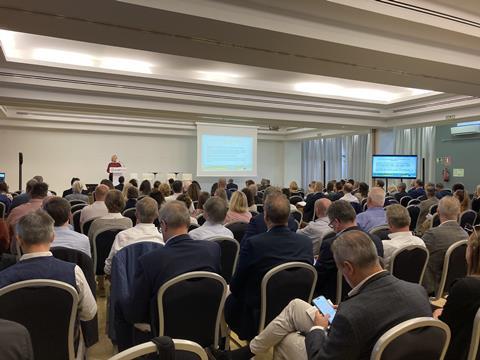This year’s conference shone a spotlight on the challenging scenario facing Europe’s fruit and vegetable producer organisations
Some 150 delegates from 17 countries met to discuss the challenging scenario for Europe’s produce industry at the 17th edition of the International Congress of Fruit and Vegetable Producer Organisations (ICOP), which took place in Almería on 22-24 November.

The event, organised by the Austrian consulting company gfa-consulting in cooperation with the Almerian association of Fruit and vegetable producer organisations, Coexphal, heard how climate change, cost pressures and an increasingly restrictive regulatory landscape are making life difficult for producers. “We are expected to fulfil more social expectations with fewer available resources,” said Luc Vanoirbeek from Copa-Cogeca.
The burdens placed on producers by the European Union’s new Plant Health Regulation and Packaging Regulation, and the impact of increasingly frequent incidences of heat, drought, flooding were among the most hotly debated topics of the first day by speakers including Simona Caselli from AREFLH, Juan Carlos Pérez Mesa from the University of Almería and Raquel Aguado of the Spanish federation for wooden packaging, Fedemco.
On day two of the conference, attention turned to how the newly revised Common Agricultural Policy, already in its first year for the current 2023-27 period, are affecting the fruit and vegetable sector, especially regarding funding opportunities via the so-called Operational Programme.
In a panel discussion which also featured Adrián Torrellas Tomé from the Spanish Ministry of Agriculture, Manuel Alías Cantón from the Rural Development Fund and Kerstin Edelmann from gfa-consulting, the European Commission’s Kristine Bori noted: “The term ‘common market policy’ contains the word ‘common’ – the joint action of all those involved in the implementation of agricultural policy, at EU level, at country level and, above all, at the level of agricultural representatives, is fundamental to success”.
Using the Austrian and German produce sectors as an example, the conference heard about the specific challenges fruit and vegetable producer organisations face in applying for EU funding under the new rules.
Kerstin Edelmann of gfa-consulting said the differing strategies in EU member states had brought many unexpected challenges for producer organisations. She echoed Bori’s call for cooperation between all parties.
As always, ICOP also heard about some of the latest innovation and trends in the produce sector. These included new developments in biological pest control; ways of making agriculture more resilient; the role of new genomics in plant breeding; technical innovations in solar power and data capture.
During the event, study tours were organised to the facilities of Casi, one of Spain’s biggest producer organisations in tomatoes with an annual production volume of over 230,000 tonnes, the University of Almería’s research centre and the Vicasol cooperative, which markets over 240,000 tonnes of fruit and vegetables to 34 countries worldwide.



